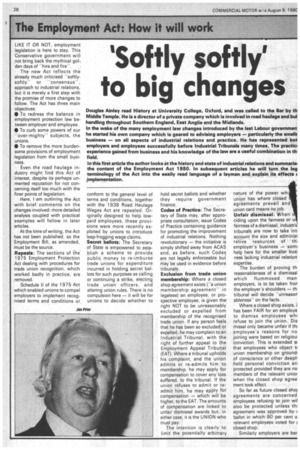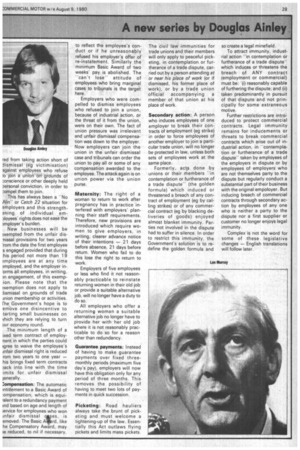'Softly softly' to big changes
Page 30

Page 31

If you've noticed an error in this article please click here to report it so we can fix it.
LIKE IT OR NOT, employment legislation is here to stay. This Conservative government will not bring back the mythical gol-, den days of "hire and fire".
The new Act reflects the already much criticised "softlysoftly" or "'consensus'', approach to industrial relations, but it is merely a first step with the promise of more changes to follow. The Act has three main objectives: • To redress the balance in employment protection law between employer and employee.
• To curb some powers of our "over-mighty" subjects, the unions.
• To remove the more burdensome provisions of employment legislation from the small business.
Even the road haulage industry might find this Act of interest, despite its perhaps unmerited reputation for not concerning itself too much with the finer points of legislation.
Here, I .am outlining the Act with brief comments on the changes involved; more detailed analysis coupled with practical examples will follow in later articles.
At the time of writing, the Act has not been published, so the Employment Bill, as amended, must be the source.
Repeals: The sections of ihe 1975 Employment Protection Act dealing with procedures for trade union recognition, which worked badly in practice, are removed.
Schedule II of the 1975 Act which enabled unions to compel employers to implement recognised terms and conditions or conform to the general level of terms and conditions, together with the 1938 Road Haulage Wages Act are repealed. Originally designed to help lowpaid employees, these provisions were more recently exploited by unions to introduce leap-frogging wage claims.
Secret ballots: The Secretary of State is empowered to .establish a scheme to provide public money to re-imburse trade unions for expenditure incurred in holding secret ballots for such purposes as calling or continuing a strike, electing trade union officers, and altering union rules. There is no compulsion here — it will be for unions to decide whether to hold secret ballots and whether they require government finance.
Codes of Practice: The Secretary of State may, after appropriate consultation, issue Codes of Practice containing guidance for promoting the improvement of industrial relations. Nothing revolutionary — the initiative is simply shifted away from ACAS and, as before, such Codes are not legally enforceable but may be used in evidence before tribunals.
Exclusion from trade union membership: Where a closed shop agreement exists ("a union membership agreement" in legalese) an employee, or prospective employee, is given the right NOT to be unreasonably excluded or expelled from membership of the recognised trade union. If any person feels that he has been so excluded or expelled, he may complain to an Industrial Tribunal, with the right of further appeal to the Employment Appeal Tribunal (EAT). Where a tribunal upholds his complaint, and the union admits or re-admits him to membership, he may apply for compensation to cover any loss suffered, to the tribunal. If the union refuses to admit or readmit him, he may apply for compensation — which will be higher, to the EAT. The amounts. of compensation are linked to unfair dismissal awards but, in either case, it is the UNION who must pay.
The intention is clearly to limit the potentially arbitrary nature of the power whi union has where closed agreements prevail and union card means no job. Unfair dismissal: When ciding upon the fairness or u fairness of a dismissal, industri tribunals are now to take int' account the size and administ rative resources of thi employer's business — SOMI help here for the smaller busi ness lacking industrial relation expertise.
The burden of proving th. reasonableness of a dismissal which flummoxed man. employers, is to be taken fron the employer's shoulders — th tribunal will decide "unreason ableriess" on the facts.
Where a closed shop exists, i has been FAIR for an employe to dismiss employees whc refuse to join the union. Dis missal only became unfair if thi employee's reasons for no joining were based on religioui conviction. This is extended sc that employees who object tc union membership on ground! of conscience or other deepli held personal conviction au protected provided they are no members of the relevant unior when the closed shop agree ment took effect.
So far as future closed shol agreements are concerned employees refusing to join wil also be protected unless /II( agreement was approved by ballot in which 80 per cent o relevant employees voted for closed shop.
Similarly employers are bar red from taking action short of Jismissal (eg victimisation) against employees who refuse o join a union on grounds of 3onscience or other deeply held aersonal conviction, in order to :.-ompel them to join.
This has always been a ' No A/inor Catch 22 situation for employers and this strengthening of individual employees' rights does not ease the employer's burden.
New businesses will be exempted from the unfair disnissal provisions for two years :rorn the date the first employee s engaged provided that during his period not more than 19 employees are at any time employed, and the employer inorms all employees, in writing, )n engagement, of this exempion. Please note that the xemption does not apply to iismissal on grounds of trade anion membership or activities, fhe_ Government's hope is to emove one disincentive to tarting small businesses on vhich they are relying to turn aur economy round.
The minimum length of a ixed term contract of employnent in which the parties could igree to waive the employee's ,infair dismissal right is reduced rom two years to one year — his brings fixed term contracts )ack into line with the time imits for unfair dismissaL jenerally.
:ompensation: The automatic intitlement to a Basic Award of :ornpensation, which is equi,alent to a redundancy payment ind based on age and length of iervice for employees who won anfair dismissal owes, is emoved. The Basic A,, rd, like he Compensatory Award, may )e, reduced, to nil if necessary, to reflect the employee's conduct or if he unreasonably refused his employer's offer of re-instatement. Similarly the minimum Basic Award of two weeks' pay is abolished. The 'can't loseattitude of employees who bring marginal cases to tribunals is the target here.
Employers who were compelled to dismiss employees who refused to join a union, because of industrial action, or the threat of it from the union, were on their own. The fact of union pressure was irrelevant and unfair dismissal compensation was down to the employer. Now employers can join the union in the unfair dismissal case and tribunals can order the union to pay all or some of any compensation awarded to the employee. The attack again is on union power via the union purse.
Maternity: The right of a woman to return to work after pregnancy has in practice interfered with employers' planning their staff requirements. 'Therefore, new provisions are introduced which require women to give employers, in writing, clearer advance notice of their intentions — 21 days before absence, 21 days before return. Women who fail to do this lose the right to return to work.
Employers of five employees or less who find it not reasonably practicable to reinstate returning women in their old job or provide a suitable alternative job, will no longer have a duty to do so.
All employers who offer a returning woman a suitable alternative job no longer have to provide her with her old job where it is not reasonably practicable to do so for a reason other than redundancy.
Guarantee payments: Instead of having to make guarantee payments over fixed threemonthly periods (maximum five day's pay), employers will now have this obligation only for any period of three months. This removes the possibility of having to meet two lots of payments in quick succession.
Picketing: Road hauliers always take the brunt of picketing and must welcome a tightening-up of the law. Essentially this Act outlaws flying pickets and limits mass pickets. The civil law immunities for trade unions and their members will only apply to peaceful picketing, in contemplation or furtherance of a trade dispute, carried out by a person attending at or near his place of work (or if dismissed, his former place of work), or by a trade union official accompanying a member of that union at his place of work.
Secondary action: A person who induces employees of one employer to break their contracts of employment (eg strike) in order to force employees of another employer to join a particular trade union, will no longer be protected in law, unless both sets of employees work at the same place.
Formerly, acts done by unions or their members -in contemplation or furtherance of a trade dispute" (the golden formula) 'which induced or threatened a breach of any contract of employment (eg by calling strikes) or of any commercial contract (eg by blacking deliveries of goods) enjoyed almost blanket immunity. Parties not involved in the dispute had to suffer in silence. In order to restrict this immunity, the Government's solution is to redefine the golden formula and
so create a legal minefield.
To attract immunity, industrial action -in contemplation or furtherance of a trade dispute' which induces or threatens the breach of ANY contract (employment or commercial) must be: .(i) reasonably capable of furthering the dispute; and (ii) taken predominantly in pursuit of that dispute and not principally for some extraneous motive.
Further restrictions are introduced to protect commercial contracts. Legal immunity remains for inducements or threats to break commercial contracts which arise out of industrial action, in "contemplation or furtherance of a trade disputetaken by employees of the employers in dispute or by 'employees of employers who are not themselves party to the dispute but regularly conduct a substantial part of their business with the original empoloyer. But inducing breach of commercial contracts through secondary action by employees of any one who is neither a party to the dispute nor a first supplier or customer no longer enjoys legal immunity.
Complex is not the word for some of these legislative changes — English translations will follow later.












































































































